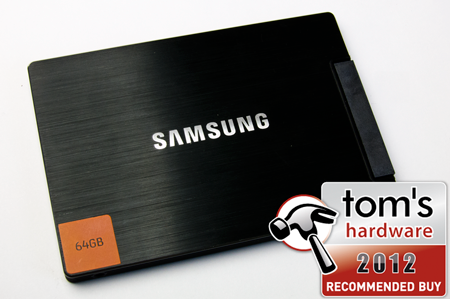60/64 GB SSD Shootout: Crucial, Samsung, And SandForce
Crowning An Entry-Level SSD Performance King
Don't automatically assume that, some day, inexpensive SSDs will overshadow the value of hard drives. Although disk drives are currently more expensive than they were a few months back, it's still difficult to argue against paying seven cents per gigabyte for conventional storage space.
In the face of expanding digital media collections, we need the scalability that expansive disks make accessible. So, let's just call it a given that your next enthusiast-oriented build will include at least one hard drive. And if the disk isn't physically inside that machine, we'll assume it's parked within a gigabit-connected storage appliance surrounded by several other hard drives instead.
Surely, that takes the pressure off of your decision to boot from an SSD. Yeah, a 256 GB solid-state device would be nice. But you can get those same great boot times we demonstrated on the previous page from a 60 or 64 GB SSD for a lot less money. We recommend 120 GB as the best-balanced capacity point. However, even half that much space is enough for Windows and a few performance-sensitive applications.
Although the 60/64 GB SSDs we tested today under-perform higher-capacity models, they're still clearly very fast. So, if you have just enough room in your budget to take a first step into the world of SSDs, we're able to comfortably recommend Samsung’s 64 GB 830 as the model to most consistently impress us throughout testing (and that's why it's getting our Tom Hardware's 2012 Recommended Buy award).
Pricing down at this entry-level segment is very similar from one SATA 6Gb/s SSD to the next. We’ve seen the 64 GB m4, 64 GB 830, and both types of 60 GB SandForce-based drives selling between $120-130. Yet, Samsung’s solution delivers much better performance most often.
Get Tom's Hardware's best news and in-depth reviews, straight to your inbox.
Current page: Crowning An Entry-Level SSD Performance King
Prev Page Real-World Tests Next Page Storage Bench v1.0, In More Detail-
Wow. Absolutely wonderful article. I did second guess my decision on SSD for my next build for a few. But honestly I'm just using it as a boot drive.Reply
-
acku kixofmyg0tWow. Absolutely wonderful article. I did second guess my decision on SSD for my next build for a few. But honestly I'm just using it as a boot drive.Reply
Glad to hear that!
Cheers,
Andrew Ku
TomsHardware.com -
rossi004 Ok, so I have the whole SSD for boot, HDD for storage and less intensive programs, but I have a practicality question:Reply
Is there a way to have files and programs automatically downloaded, installed, and run from the HDD without doing it manually every time if I have the SSD as the base drive?
-
james_1978 rossi004Ok, so I have the whole SSD for boot, HDD for storage and less intensive programs, but I have a practicality question:Is there a way to have files and programs automatically downloaded, installed, and run from the HDD without doing it manually every time if I have the SSD as the base drive?Reply
You can move your personal folders to your HDD (my documents, my music, downloads, ...), so downloads will end up there automaticaly, but programs will go to your C drive (SSD) by default. -
james_1978 james_1978You can move your personal folders to your HDD (my documents, my music, downloads, ...), so downloads will end up there automaticaly, but programs will go to your C drive (SSD) by default.Ok, sorry, but actually you can move your program files by editing the registry:Reply
Moving only user files is far easier nevertheless, just using "move" in the folder properties... -
james_1978 james_1978Ok, sorry, but actually you can move your program files by editing the registry:Moving only user files is far easier nevertheless, just using "move" in the folder properties..."Add an url" didn't quite work for me :-)Reply
http://www.tomshardware.com/forum/6643-63-windows-boot-drive-user-files-program-files-normal -
Soul_keeper nice articleReply
Worth mentioning, plextor PX-M3S are micron based and use toggle nand
I don't think they make a 64GB version however
